COMPILED BY STEVE MOKAYA AND MAURICE O. NDOLE
President William Ruto visits Ethiopia amid war with Tigray
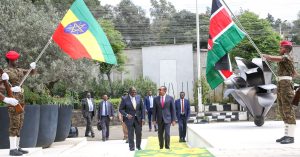
Ethiopia is currently involved in a bloody civil war with the autonomous region of Tigray, which started in November 2020.
Ruto arrived in the country at a moment when the ceasefire between the Ethiopian Central government and Tigray People Liberation Front (TPLF) has resumed in full scale since September 1, 2022.
Debate on who’s to blame for the situation is raging on social media with both factions accusing each other crimes against humanity.
It’s unclear whether Ruto would comment about the situation, but former Kenyan President Uhuru Kenyatta is tagged to play a role in negotiating a peaceful end of the conflict.
Ruto Admin Faces Backlash after lifting 10-year-old Ban on GMO Foods.
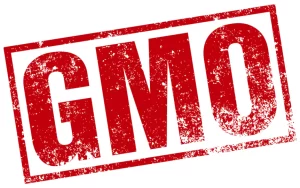
The outgoing Kenyan cabinet, chaired by President William Ruto, also authorized the importation of food crops and animal feeds produced through biotechnology innovations.
“The decision by the Cabinet, chaired by President William Ruto at State House today, was made in accordance with the recommendation of the Task Force to Review Matters Relating to Genetically Modified Foods and Food Safety,” State House Kenya tweeted Monday.
“The meeting was convened to consider the progress made in the response to the ongoing drought in the country,” it added.
The lifting of the proscription of GMOs now makes Kenya the second country in Africa to allow GMO foods. In 1996 South Africa okayed the planting and importation of biotechnology foods by passing the Genetically Modified Organisms Act.
Kenya has been experiencing severe famine, like the rest of Africa, particularly the Horn of Africa region, thanks to Climate Change occasioned biting drought since 2020.
Last week, Ruto flagged off relief food to 23 counties facing food shortages. Many wild and domestic animals are already succumbing to drought and hunger. The most affected regions are Northern and North Eastern Kenya. Meanwhile, food prices continue to rise, with a kilogram of maize flour now retailing at Sh 100.
Former Health Minister Beth Mugo banned GMO foods in 2012 after a publication by French scientist Eric Seralini asserted that GMO foods were linked to cancer after a mouse fed on it developed a cancerous tumor. The journal was, however, recalled two years later because it was not definite on the matter.
Since lifting the 2012 moratorium on Monday, many Kenyans, including leaders, civil society groups, and politicians, have criticized Ruto’s administration, saying it will open floodgates to cancers and other health complications.
&nbs Darlene Kinyanjui said: “We are about to get fuller Cancer wards. Please rethink this decision.”
On the other hand, one Abdrizakh Sheikh supported the ban’s cancellation, citing that South Africa has been using it for a quarter century.
“If we can receive Genetically modified food from donors when there’s a food shortage or drought, I don’t see anything wrong with farming GMO crops. South Africa’s food is entirely dependent on GMOs,” Sheikh said.
Renowned Kenyan lawyer Donald Kipkorir also criticized the move, saying even the developed nations of the world steer clear of GMO foods.
“France, Germany, Austria, Greece, Netherlands, and Denmark have a total ban on GMO Food and products. The EU doesn’t accept GMO Foods. Which science did we use to unban GMO foods? Surely, our science is centuries behind the EU,” he said on Twitter.
Reuben Kigame, a famous evangelist and presidential aspirant in the last elections, said Kenya should refuse GMOs for the sake of posterity.
“I am happy to shut up and let you guys run your country the way you want, but I have children! Why condemn our beautiful country to GMOs? Food security is not just about quantity but, more importantly, quality. Stop this and let our children thank us later,” Kigame said.
Even Miguna Miguna, an ardent supporter of Ruto, raised his voice against the decision to allow biotechnology foods.
“On the GMO issue, we are saying a firm no,” Miguna tweeted.
Ten civil groups have also resisted the government’s move to permit GMO importation and usage in Kenya. The groups, including the Biodiversity and Biosafety Association of Kenya, and the Consumer Grassroots Association, have threatened to take legal action against the government if the ban is not reapplied.
“Why was there a hurry in lifting the ban without the involvement of citizens?” Anne Marina, Biodiversity and Biosafety Association of Kenya’s National Coordinator, asked.
Eustace Kiarii, CEO of Kenya Organic Agriculture Network, said, “the Cabinet disregarded the fundamental precautionary principle and acted in utter contempt of the interests of farmers, food consumers, and the overall public.”
Meanwhile, following Kenya’s move, Tanzania has said it will carefully monitor the food situation in Kenya to ensure that GMO food does not find its way to Tanzania.
“We are not open to such GM technology, and Kenya’s decision has no effect on us,” Agriculture Minister Hussein Bashe told the Tanzanian media.
Bashe said GMO trials in the country will only be allowed for academic purposes to help the country and its people to have a broad understanding of genetically modified varieties, “especially the benefits and impact on the environment.”
Tanzania abolished GMO research trials in January 2021 by former Agriculture Minister Adolf Mkenda to conserve the country’s heritable resources and local grain.
Questions Linger Regarding the Death Of Grace Wangui, A Kenyan Woman working as a domestic worker in Egypt

Circumstances surrounding the death of a Kenyan woman murdered in Cairo, Egypt, remain unclear almost a month after her murder.
Grace Wangui, believed to be 34, worked as a domestic worker when she met her death on the night of September 23rd.
Madam Soha, the agent who found Wangui the job, said her employer’s son killed her.
“The guy hit Grace with something in the head and threw himself through the window, and they’re both dead,” the recruiter said.
Apparently, upon realizing he had killed Wangui, the man committed suicide by jumping from the 13th floor of the building.
Sources in Egypt familiar with the incident have refuted reports that Wangui’s body was also thrown from the 13th floor. Reports from various online media stating that Wangui was murdered after refusing sexual advances from her killer remain unconfirmed.
Madam Soha said she hired Wangui to care for the older man on September 14, but after a few days on the job, Wangui called and complained the man’s son was harassing her.
The recruiter said she spoke to the employer about Wangui’s complaints, but the man assured her that his son was just on a short visit and would return to Canada in a few days, resolving the matter.
She did not hear from Wangui again until Thursday, September 22, when she woke up to find multiple messages from Wangui and a missed call. Wangui said weird things were happening at the house that night.
&nbs While she was still processing the messages from Wangui, about two hours later, she was contacted by Wangui’s husband, who told her he couldn’t reach her. Soon after, she heard from her driver, who told her somebody from Wangui’s employer’s family was asking for her passport.
Soha said the police contacted her and informed her that Wangui was killed in the night.
Wangui’s death is the latest of several fatal incidents among Kenyans in the Middle East. While most casualties reported have occurred in Saudi Arabia, several Kenyans have lost their lives in Egypt.
A Kenyan living in Egypt who requested anonymity said their community had suffered at least five deaths.
An official at the Kenyan Embassy in Egypt declined to comment on the story and referred us to the Ministry of Foreign Affairs in Nairobi.
Note: This is a developing story. We’ll keep updating it as we gather more information.
President Ruto names Cabinet
Tuesday morning last week, President William Ruto chaired the Cabinet of former President Uhuru Kenyatta, the first one in a long time and the last for the regime whose term officially ended on September 13.
In the afternoon, he called a presser at the State House and named his Cabinet– the men and women he’ll work with to realize his vision for the country and deliver on his promises. Signaling the new chief had arrived, Ruto did away with the former Cabinet, not retaining even one of Uhuru’s Cabinet Secretaries.
In the proposed Cabinet, three holders are already elected to various national seats in the August 9 general election. These include Kipchumba Murkomen (who had been reelected the senator of Elgeyo Marakwet), Alice Wahome (who had been reelected the MP for Kandara Constituency), and Aden Duale (who had been reelected the MP for Garissa Township Constituency). Murkomen is nominated to be in charge of roads and national transport, and the President has named Wahome the cabinet secretary for water and sanitation. If confirmed, Duale will become the cabinet secretary in charge of the defense docket.
If the three are vetted in by the national assembly, then the IEBC will be required to conduct by-elections in these areas to replace the three elected leaders.
In the proposed Cabinet, Amani National Congress leader Musalia Mudavadi is the Chief Cabinet Secretary. The post is currently not provided for in the current constitution but, if created, will be an equivalent of a prime minister position, thus putting the former vice president as the third most powerful man after the President and his deputy.
Below is the complete list of the nominated cabinet secretaries.
&nbs
1. Interior Ministry — Prof Abraham Kindiki
2. National Treasury – Prof. Njuguna Ndung’u
3. Public Service Gender and Affirmative Action – Aisha Jumwa
4. Defence – Aden Duale
5. Water Sanitation – Alice Wahome
6. Foreign and Diaspora Affairs – Alfred Mutua
7. Trade, Investment, and Industry – Moses Kuria
8. East Africa Community, Arid and Semi-Arid Lands and Regional Development – Rebecca Miano
9. Roads, Transport, and Public Works – Kipchumba Murkomen
10. Environment and Forestry – Roselinda Soipan Tuya
11. Lands, Housing and Urban Development – Zachariah Mwangi Njeru
12. Tourism, Wildlife, and Heritage – Peninah Malonza
13. Agriculture and Livestock Development – Mithika Linturi
14. Health – Susan Nakumicha Wafula
15. Information, Communication, and Digital Economy – Eliud Owalo
16. Education – Ezekiel Machogu
17. Energy and Petroleum – Davis Chirchir
18. Youth Affairs Sports and Arts – Ababu Namwamba
19. Cooperatives and MSME development – Simon Chelugui
20. Mining, Blue Economy and Maritime Affairs – Salim Mvurya
21. Labour and Social protection – Florence Bore
Notable figures missing in the proposed Cabinet include Ndindi Nyoro, Hassan Omar, Nairobi Woman Representative candidate Millicent Omanga, former Laikipia MP Cate Waruguru, and David Ndii, among others.
It’s unclear why these key leaders who stood with the President during the campaign are not in the Cabinet. For example, Nyoro, the Member of Parliament for the Kiharu Constituency, fought for Ruto in and out of Parliament, sustaining criticism from Uhuru’s administration and Ruto’s political enemies.
When Ruto was unveiling Rigathi Gachagua as his running mate, he said of Nyoro: “My younger brother, you have a bright future.” Thus, there was a general feeling that Ruto would allocate a cabinet docket to the vocal MP.
Omar flew the President’s UDA flag in the Mombasa gubernatorial elections and lost to ODM’s Abdulswamad Nassir. Omar was also one of the President’s vocal point men in the coast region and was expected to be in the Cabinet.
Ndii, the famous economist and activist, was the brains behind the Kenya Kwanza bottom-up economic model that excited the masses during the campaign. He shared the principles behind the model with Ruto’s followers and the general public to win hearts and votes. Ndii is still believed to be a close economic advisor to the President. Many Kenyans expected the President would name him the CS for either Cooperatives and MSME development or Trade.
A curious addition to the Cabinet is the Ministry of Foreign and Diaspora Affairs, proposed to be headed by Mutua. The ministry is a fulfillment of Ruto’s pledge to elevate the diaspora to the Cabinet level. But some leaders in the diaspora are disappointed that Ruto did not designate a stand-alone ministry. They see merging diaspora matters with foreign affairs would deny the diaspora the dedicated government body that would directly address their concerns.
For example, they point out the issues facing Kenyans in the Middle East who have suffered discrimination and death at the hands of their hosts without much help from Kenya’s Ministry of Foreign Affairs.
But not all is lost for those who have not yet received an appointment in the proposed Cabinet. Several other plum government jobs remain, such as principal secretaries, ambassadors, and heads of parastatals, which are likely to be given to those who campaigned for and supported Ruto in the lead-up to the election.
&nbs
President Ruto addresses the 13th Parliament for the first time
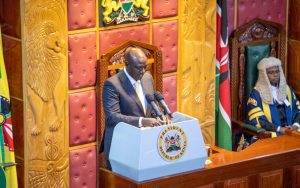
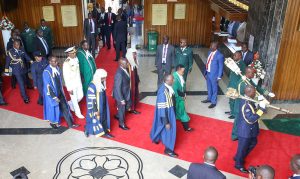
Ruto urged the legislators to serve Kenyans in all wards, constituencies, and counties in every region without discrimination or favor.
“After all, we all serve the same boss; the people and their sovereign interests are our operating principle and purpose,” Ruto said.
He further said there are plans to restore sanity and introduce greater responsibility in managing public resources. He said his administration would abandon consumption subsidies to support and invest in domestic production.
He said Kenya’s economy is doing dismally, and for the situation to change, there was a need to invest at least 25 percent of the country’s GDP.
“The hustler economy has to flourish and form the foundation of broader economic transformation while catalyzing the widening of the national revenue base,” the President said.
Ruto added that his administration would allocate resources yearly to the hustler fund from which Micro, small and medium enterprises (MSMEs) can access affordable credit to start and expand their businesses.
The President disclosed former Government had budgeted to borrow Ksh900 billion to finance both development and recurrent expenditure, a thing he sharply disagreed with and criticized.
“The Government should never borrow to finance recurrent expenditure. This is not right, prudent, or sustainable. It is simply wrong. We must bring ourselves back to can’t,” Ruto said.
He ordered the National Treasury to work with Ministries to cut Sh 300 billion from the 2022/23 budget to make it sustainable.
SPORTS
Eliud Kipchoge breaks his record in Berlin
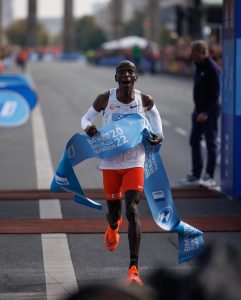
Kipchoge’s new world record was 30 seconds faster than his previous record, which he also set in Berlin in 2018.
After the victory, the champion said: “Limits are there to be broken. By you and me together.”
“I can say that I am beyond happy today that the official world record is once again faster. Thank you to all the runners in the world that inspire me every day to push myself whereby. I hope this result will inspire you to break your own limits.
“Whether that is your first run, a new personal best, and anything in between. Believe that with the right heart and mind, you can achieve greatness in all of life,” Kipchoge said.
Kenya’s President William Ruto led Kenyans in hailing the marathoner.
“The greatest has done it again, breaking the world record! Congratulations, Eliud Kipchoge, for winning the Berlin Marathon for the fourth time. You are truly the King of the Marathon,” Ruto said.
Raila Odinga, the former Prime Minister Azimio la Umoja’s presidential flag bearer in the last election, also congratulated Kipchoge and praised him for making Kenya proud.
“You were already arguably the best marathoner, and now you’ve taken your domination of the distance notches higher. A great precision run flawlessly executed once more, breaking the world record. Congratulations, Eliud Kipchoge. Keep flying our flag high,” Odinga said.
Task Force to review Kenya Education System, CBC formed
President Ruto Friday assigned an education task force of 42 members to look into the country’s Education system and come up with recommendations, particularly on an applicable structure for implementing the Competency-Based Curriculum (CBC).
Via a gazette notice issued on September 30, Ruto said the Working Party on Education Reform would work for six months and would be required to submit a progress report every two months from their appointment.
Prof. Raphael Munavu will chair the task force. It encompasses, among others, globally celebrated Kenyan teacher Peter Tabichi.
Tabichi was crowned the world’s best teacher in 2019 and awarded a $1m prize, beating 10,000 nominations from 179 countries.
The task force will study all laws governing the basic education subsector and make recommendations for review of the legislation to address “duplication, ambiguities, efficiency, constraints and improving linkages.”
The task force will be required to study, assess, and make recommendations on “the conceptualization and implementation of key tenets guiding the competency-based approach including but not limited to value-based education, community service learning, parental empowerment, and engagement.”
During the campaign, Ruto and his Kenya Kwanza allies promised to look into CBC to accommodate concerns from parents, teachers, and stakeholders in the education sector.
Two weeks ago, while attending the annual music festivals in Kisumu, Deputy President Rigathi Gachagua said the Government would form a team that would review the CBC system but would not abolish it.
“Our new Government will very soon be unveiling a task force to look at educational reforms, including CBC, with a view of not abolishing it but reviewing it so that we retain what is good and improve what is [not good],” Gachagua said. “When that team is unveiled and will be going around the country, please don’t just complain at home or in market centers. Please turn up and present these people with your views on what you think should be done to improve CBC and the entire education system,” Gachagua said.
&nbs
Azimio la Umoja MPs tear-gassed while on a protest march to the IEBC.
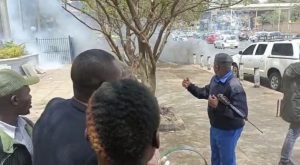
The legislators were on their way to the Independent Electoral and Boundaries Commission (IEBC) headquarters at Anniversary Towers in Nairobi to protest the interdiction of Deputy Chief Executive Officer Ruth Kulundu.
The procession was disrupted and scattered.
The MPs, led by Ruaraka MP TJ Kajwang’ led their supporters in marching to Anniversary Towers to present their petition against the recent interdiction.
The other lawmakers were Peter Orero (Kibra), Amos Mwago (Starehe), George Aladwa (Makadara), Mark Mwenje (Embakasi West), Vihiga Senator Godfrey Osotsi and Landi Mawe MCA candidate popularly known as Ghetto President.
“We have a right to be told what procedure is taken by IEBC against some of its staff,” Mwago said.
The MPs said the move by IEBC was malicious and was out of perceived links with Azimio during the August 9th General Election.
The IEBC is facing ongoing internal turmoil after four commissioners disowned presidential election results that declared William Ruto President.
Kulundu is aligned with the four because she questioned the decision to postpone the Mombasa and Kakamega gubernatorial races.
Kajwang said Kulundu’s interdiction was unconstitutional, and she deserved a hearing.
On Friday, the Employment and Labor Relations Court temporarily suspended IEBC CEO Marjan Hussein Marjan’s order to bar Ruth from performing her duties as the IEBC’s Deputy Commission Secretary of Operations.
The Court has scheduled the parties to appear in Court on October 24.
&nbs
Ebola scare in Kakamega
Friday, September 30, Kenyans’ hearts skipped a beat after a suspected Ebola case was reported in Mumias, Kakamega County.
After tests, the medical report of the suspected patient, Gideon Ashibo, 32, ruled out the man had Ebola.
The resident of Nambale in Busia County had exhibited signs similar to those of the deadly viral disease currently spreading in neighboring Uganda.
Ashibo is reported as having general body weakness and a stitched wound at the right upper limb, which was actively bleeding. He also exhibited blood in his urine.
Two weeks ago, the patient traveled to the eastern parts of Uganda to visit a relative.
While in Uganda, he sustained an injury that caused an open wound. He sought medical attention at a health facility in Uganda, which sutured the cut.
He later moved to Kenya for further medical attention. On September 28, 2022, he started experiencing blood in urine and proceeded to St Mary’s hospital Mumias for further management.
Kenya and Tanzania are on high alert for Ebola cases after an outbreak in Uganda.
High Court revokes degree requirement for governors.
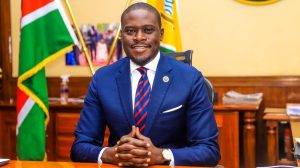
On Friday, September 30, the Kenyan High Court struck out the degree requirement for people vying for the gubernatorial seat in Kenya, terming it illegal.
Justice Anthony Mrima, in the ruling, decreed that section 22 (ii) of the Election Act, which requires gubernatorial aspirants to have a degree before being cleared to vie, contravenes Article 180(2) of the constitution.
Article 180(2) of the constitution provides that to be eligible for election as county governor, a person must be eligible for election as a member of the county assembly.
Currently, according to Kenya’s Elections Act, for one to qualify to vie for the seat of the Members of the County Assembly, you only require a form four certificate (KCSE).
Justice Mrima asserted that since Article 180 (2) of the constitution provides that the eligibility of the county governor and that of the member of the county assembly be the same, the election Act cannot, therefore, differentiate the two.
“A declaration hereby issues that section 22(ii) of the Election Act contravenes Article 180(2) of the constitution by creating an avenue for differentiation between the eligibility requirement of a governor and member of the county assembly; hence to that extent, it’s unconstitutional,” Mrima said.
The verdict will, however, take effect in the next general election.
“With a view of forestalling an avalanche of petitions by those who are ineligible by date of the imputed section and coupled with the late filing of the petition, the declaration of unconstitutionality of section 22(ii) of the election act shall take effect in the next general election,” Justice Mrima ruled.
Several gubernatorial candidates in the just concluded elections faced petitions over their qualifications, owing to the degree requirement. They included Aisha Jumwa (Kilifi County), Cleophas Malala (Kakamega County), and Johnson Sakaja (Nairobi County).
Lawyer Ndegwa Njiru and other Kenyans criticized the ruling, saying it would open doors to poor governance.
“Even our courts have been hustlernized. The judgment by Justice Mrima scrapping the degree requirements for governors is very pedestrian, to say the least, it’s barbaric, retrogressive, lacks ingenuity, hurts fundamentals of our society, and will contribute to bad governance,” the lawyer said.
Lindy Wafula said the ruling was a mockery of education. “The judgment for governors not to have degrees to be elected is actually telling us going to school is a waste of time,” Wafula said.
Famous lawyer Donald Kipkorir also castigated the ruling, saying it is unconstitutional.
“The Constitution doesn’t provide that to be President, MP, Senator, Cabinet Minister, Doctor, Engineer, CBK Governor, IG, Auditor General et al.; one needs to be a graduate. The High Court decision that requiring Governors not to be graduates is unconstitutional will open doors to all illiterates,” Kipkorir said in a tweet.
&nbs
Turkana banditry resurgence
On September 24, a calm Saturday, eight police officers, two civilians, and a local chief were slain in a bandit attack in Turkana.
The National Police Service stated that the officers were pursuing the cattle rustlers when the armed bandits attacked them. The attacker escaped with some of the livestock that they had stolen.
Pokot cattle rustlers were blamed for the attack.
One of the victims who lost their lives is a sister of Thirdway Alliance Party Leader Ekuru Aukot.
“The National Police Service regrets to inform on the criminal and cowardly ambush by cattle rustling bandits on innocent members of the public and police officers.
“The officers were in hot pursuit of Pokot bandits who had raided a village in Turkana East and made away with livestock,” Police spokesperson Bruno Shioso said.
Shioso said the Government had dispatched additional officers to heighten security in the area and pursue the attackers.
“NPS reassures the public that all necessary measures shall be taken to restore security and safety in the region,” Shioso said.
President Ruto instructed the security agencies to deal firmly with the culprits and promised to end cattle rustling.
“After receiving a comprehensive report on the Turkana/Pokot incident that led to 10 security/administration officers losing their lives, I have instructed security agencies to deal firmly, decisively, and conclusively with those involved. Cattle rustling will stop na sio tafadhali,” the President said.
Miguna Miguna Homecoming: Some see Fundraiser as exploitative and ill advised.
On September 20, lawyer Miguna Miguna announced on his Twitter account that President William Ruto had had his passport delivered to his home in Toronto, Canada. The development, Miguna said, was a big step to his homecoming in Kenya.
Miguna was forcefully exiled from Kenya in 2018. The Kenyan authorities claimed the lawyer was not legally Kenyan because he had earlier relinquished his Kenyan citizenship when he attained Canadian citizenship.
“I have never, ever renounced my Kenyan citizenship and will never do that. I’ve never even contemplated it,” Miguna said in 2018.
The government then said the lawyer automatically forfeited his Kenyan citizenship when he attained Canadian citizenship because Kenyan citizens were allowed only one nationality under the repealed Kenyan Constitution.
The ministry of interior said after the 2010 Constitution came into effect, Kenyans with foreign citizenship needed were required to reapply to regain their citizenship, an extra step that Miguna refused to do.
Ruto promised to allow Miguna to return to Kenya if elected President. In an interview with Eugene Anagwe of LookUp TV, Miguna cited Ruto’s promise to allow his return to Kenya as one reason for supporting Kenya Kwanza.
The promise granted Ruto a vicious attack dog with a massive following on Twitter, known to his fans as the General.
His no-holds-barred tweets often target Azimio la Umoja flagbearer Raila Odinga, whom he calls a conman, and former President Uhuru Kenyatta, whom he calls a despot, have shaped the narrative for the Kenya Kwanza campaigns.
It’s unclear whether Miguna went through the process other Kenyans go through to regain their Kenyan citizenship as required by the law.
Section 10(1) of the Kenya Citizenship and Immigration Act, 2011 provides:
- A person who was a citizen of Kenya by birth and who ceased to be a citizen of Kenya because he or she acquired the citizenship of another country may apply, in the prescribed manner, to the Cabinet Secretary to regain Kenyan citizenship.
- The application under subsection (1) shall be accompanied by—
- proof of applicant’s previous Kenyan citizenship;
- proof of citizenship of the other country;
Miguna has announced to his 2.3 million Twitter followers that he plans to fly back to Kenya on October 20 at 6 PM EAT.
“1687 days after despot Uhuru Kenyatta, conman Raila Odinga, Fred Matiang’i, Karanja Kibicho and Gordon Kihalangwa (Rtd Gen) conspired to illegally seize and destroy my Kenyan Passport, President William Ruto has had a new one delivered to me. Waiting for the lifting of red alerts,” Miguna tweeted last month.
He would later confirm his date and time of landing in Kenya at the Jomo Kenyatta International Airport (JKIA).
“Arrival date and time have been changed by popular demand. Arrival: October 20, 2022, at 6.00 AM. See you at the JKIA, Patriots,” he said.
Since then, a fundraising poster has been going around on social media, asking Kenyans to fundraise money for Miguna’s return. Some people wonder why Miguna, believed to be wealthy, is fundraising for his homecoming journey.
But Miguna has defended the fundraising effort.
“They are not conmen. They are honest Kenyans trying to raise funds legally from those willing to give freely in order to accord me the homecoming they are planning. There is nothing dishonest about that. I only associate with people of integrity. And this is integrity,” Miguna said on Twitter.
STORY CONTINUES BELOW
This Miguna Miguna's 'homecoming fundraiser' is now taking things a bit too far.
Don't be misused.
Let the General foot all his bills, including the 'homecoming'. pic.twitter.com/ckv2y3B5Cp
— Abuya O. Abuya (@AbuyaOAbuya) October 2, 2022
Agnes Sulwe, one of the Twitter users sharing the fundraising poster, said: “Political fundraisers are held everywhere in the world, so there’s nothing wrong about this poster. We are being part of this fundraiser for goodwill and because this is one of the ways we can show our support, however little to Miguna Miguna. Together we can do this!”
Meanwhile, others like Truman Capote differed with Sulwe and were disappointed at the fundraiser.
“Kenyans have been in a tough economic crisis, you have the capability of jetting back without asking for help. Stop being a greedy fool,” Capote admonished Miguna on Twitter.
To Capote, the lawyer reverted, calling him a zombie.
“Zombie. I’ve booked my own flight even though those who forced me out and blocked me from returning should have done so. It has cost me more than $3,000. I booked five other flights and spent tens of thousands of dollars in hotels previously, but the Impunity Merchants blocked me,” Miguna said.
While Miguna supported Ruto during the campaigns, it’s not a guarantee the outspoken lawyer with an online army would be silent when the government does not keep its promises.
He has criticized the President for chairing a meeting with a lame-duck cabinet lifting the ban on Genetically Modified Organisms (GMO) foods.
“GENETICALLY MODIFIED FOODS and SEEDS are not good for human beings. They cannot be good for Africans in general and Kenyans in particular. I have a huge issue with despot Uhuru Kenyatta’s PRIMITIVE cabinet approving GMOs,” Miguna tweeted.
Some have cautioned Miguna that he might find himself in the same position he was with Kenyatta if he keeps antagonizing Ruto.
Kenyan is waiting to see how the Ruto admin would navigate its relationship with the outspoken lawyer.
WIDER AFRICA
Burkina Faso Coup
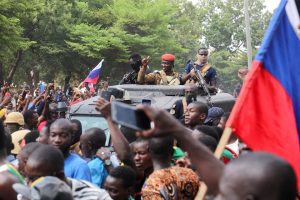
Friday, September 30, 2022: Soldiers armed with various top-notch guns patrolled the streets of Ouagadougou, Burkina Faso. The top military leadership would later confirm the ouster of President Paul-Henri Damiba.
It was the second coup in the poverty-stricken West African country this year.
Early that day, gunfire was reported in the capital city. Explosions also went off near the presidential palace. International media reported bouts of heavy gunfire in the capital. Military choppers circled the town that came to a standstill that fateful day.
Army Captain Ibrahim Traore, the country’s new leader, appeared on state TV encircled by soldiers.
He announced that the Government was dissolved, the constitution suspended, and the borders closed. In addition, he imposed a dusk to dawn curfew until further notice.
Paul-Henri Damiba, who similarly seized power in January, is said to have fled.
Moussa Faki Mahamat, the head of the African Union, condemned the Saturday coup and called for calm in the Western African country.
“The chairperson calls upon the military to immediately and totally refrain from any acts of violence or threats to the civilian population, civil liberties, human rights,” the AU said in a statement released on Saturday.
The AU also called for the restoration of the constitutional order by July next year.
The United Nations chief, António Guterres also condemned the coup and “any attempt to seize power by the force of arms” and called on all actors to “refrain from violence and seek dialogue.”
“Burkina Faso needs peace, stability, and unity to fight terrorist groups and criminal networks operating in parts of the country,” Guterres said.
BBC To Broadcast “Focus on Africa” from Nairobi in bid to manage budget.
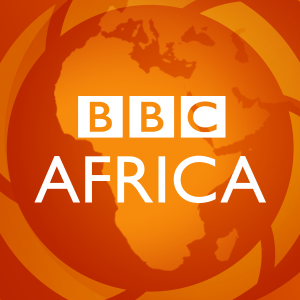
The UK-owned global media company will stop airing radio programs in 10 languages, including Chinese, Hindi, and Arabic.
However, no language services will close as the BBC plans to move several of its programs to digital only. It also said some production would move out of London.
The Thai service will move to Bangkok, the Korean service to Seoul, and the Bangla service to Dhaka.
The “Focus on Africa” television bulletin will also move from London to Nairobi, Kenya.
The TV news bulletin is a presentation of the biggest stories from all over Africa and worldwide, led by the BBC team. It is currently being broadcast from London, the BBC’s headquarters.
“The way audiences are accessing news and content is changing, and the challenge of reaching and engaging people around the world with quality, trusted journalism is growing,” said BBC World Service director Liliane Landor.
The BBC will also shift its focus away from providing news bulletins via different broadcasters and convince audiences to use its outlets and website for news and other programs.
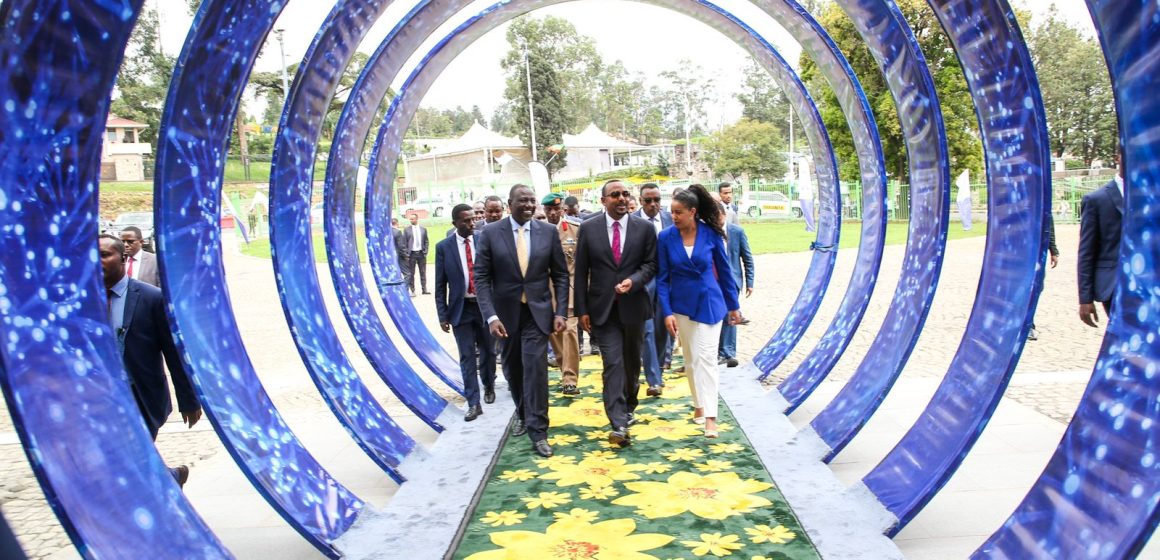






















































































LEAVE A COMMENT
You must be logged in to post a comment.